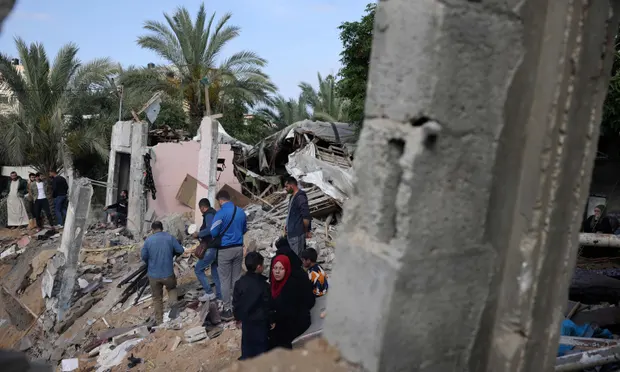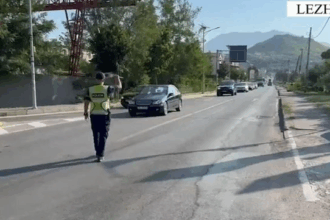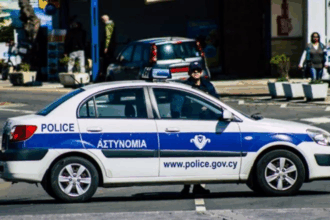
Relative calm has returned to the blockaded Gaza Strip after a ceasefire that has ended five days of cross-frontier fire between Israel and militant groups in the coastal enclave that killed 33 Palestinians and two people in Israel.
A truce mediated by Egyptian officials that went into effect at 10pm (8pm BST) on Saturday night appeared to hold, despite the firing of a rocket towards southern Israel on Sunday evening that Palestinian factions said had launched due to a “technical error”.
The Israel Defence Forces (IDF) said it responded with tank artillery fire that hit two military sites belonging to Palestinian Islamic Jihad. No injuries were reported.
The latest conflagration between Israel and Islamic Jihad, the second largest militant group in the strip after Hamas, began overnight on Tuesday, when the IDF launched surprise airstrikes targeting the homes of three of the faction’s commanders, despite a fragile ceasefire in place since a day of cross-frontier fire the week before.
The violence – the most significant bout of fighting in the region in months – left 33 Palestinians dead, including at least 10 civilians, and killed an Israeli woman and a Palestinian man from Gaza working in Israel.
On Saturday night, ambulances and fire engines drove in convoy while Palestinians gathered in the streets to celebrate.
On Sunday morning, fishers returned to the water, and the two crossings with Israel were reopened, allowing patients from Gaza to access medical care outside the strip for the first time in days, and medicine, food and fuel to make its way in.
Medics said 190 people had been wounded in Gaza and 30 in Israel, seven with injuries resulting from Palestinian rocket fire and the rest while heading to shelters. In Gaza, more than 50 homes were destroyed and about 950 people displaced by the violence, local officials said.
Israeli schools near the Gaza periphery remained closed on Sunday, with all restrictions expected to be lifted by Sunday night.
In Deir al-Balah, a conservative town in the centre of the Gaza Strip, residents ventured out on Sunday morning for the first time in days to inspect the damage.
Yahya Abu Obeid, 55, lost his home after it was targeted by Israeli strikes in the 2014 war, rebuilding it three years later. This week, the two-storey building was destroyed again, leaving the construction worker and nine members of his extended family homeless.
“We live with a great injustice. I do not know if or when this house will be rebuilt. This is a civilian house, what is the military benefit in destroying it? Nothing. What do [the Israelis] want from us?” he said.
An apartment belonging to neighbour Youssef Sarsour, married with two children, was also severely damaged in the attack.
“I don’t have any money to rebuild and some homes from 2014, they still were not rebuilt,” the 32-year-old said.
“Our life is difficult in every sense of the word. We live in harsh conditions … there is poverty, and on top of all this there are wars and destruction.”
Israel and Islamic Jihad have both warned they would not hesitate to resume fire if the other side violated the agreement. Tensions have flared in the last week since the death on hunger strike in Israeli custody of Khader Adnan, a prominent political figure affiliated with the group.
Gaza’s population has next to no freedom of movement, and healthcare, electricity, sanitation and other crucial infrastructure have all but collapsed in the 16 years since Israel and Egypt imposed a strict blockade after a takeover by Hamas, the powerful Palestinian Islamist movement. Since 2007, the two sides have fought four devastating wars and several smaller conflagrations.
amas has largely stayed on the sidelines during recent flare-ups. A joint statement from the factions claiming responsibility for retaliatory fire described it as a “broad response”, but Israeli officials appear to have calculated that the more powerful group did not want to risk a return to full-blown conflict.
“Quiet will be met with quiet,” the office of the Israeli prime minister, Benjamin Netanyahu, said in a statement. “If Israel is attacked or threatened, it will continue to do everything it needs to in order to defend itself.”
Tariq Salmi, an Islamic Jihad spokesperson, said if Israel “commits any foolish act or any assassination … the resistance will resume where it left off”.
The escalation has been claimed as a victory by both sides.
“This may become a problem for Hamas. Islamic Jihad has become a strong competitor in terms of confrontation with Israel … they are the ones leading the confrontation with Israel four times since 2019, not Hamas,” said Mukhamar Abu Saada, a professor of political science professor at Azhar University in Gaza City.
“It could constitute a threat to Hamas and its popularity among Palestinians who support military action.”
Tensions in the Israeli-Palestinian conflict have soared over the past year: more than 130 Palestinians and at least 20 Israelis and foreigners have been killed in 2023 so far across Israel, the West Bank and the Gaza Strip.
The region remains on edge ahead of Jerusalem Day on Thursday, in which thousands of Israeli religious nationalists are expected to parade through Muslim areas in the heart of the divided holy city, a move seen as deeply provocative by the Palestinians.
The annual flag march takes place around sunset on the date Israel celebrates the capture and later annexation of East Jerusalem in the 1967 war, a step that has never been internationally recognised.
… as 2023 gathers pace, and you’re joining us from Albania, we have a small favour to ask. We are living through turbulent times, but the Guardian is always there, providing clarity and fearless, independent reporting from around the world, 24/7.
We know not everyone is in a position to pay for news. But as we’re reader-funded, we rely on the ongoing generosity of those who can afford it. This vital support means millions can continue to read reliable reporting on the events shaping our world. Will you invest in the Guardian this year?
Unlike many others, we have no billionaire owner, meaning we can fearlessly chase the truth and report it with integrity. 2023 will be no different; we will work with trademark determination and passion to bring you journalism that’s always free from commercial or political interference. No one edits our editor or diverts our attention from what’s most important.
With your support, we’ll continue to keep Guardian journalism open and free for everyone to read. When access to information is made equal, greater numbers of people can understand global events and their impact on people and communities. Together, we can demand better from the powerful and fight for democracy.





https://t.me/s/officials_pokerdom/3968
https://t.me/s/bEeFcaSiNO_oFfiCiALS